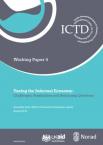ICTD Working Paper 23
A large body of cross-country econometric research has investigated the possibility of a political resource curse, by which access to extensive natural resources reduces the extent of democracy and accountability. However, this literature has been plagued by problematic data and correspondingly inappropriate model specification. Dominant theories of the political resource curse focus on the political consequences of differences in the composition of government revenue, with greater reliance on non-tax revenue undermining democracy. However, most studies do not actually test this relationship: owing to the poor quality of government revenue data, they have focused instead on the impact of total resource income on democracy – a reasonable, but imperfect, approximation of the actual theory. Meanwhile, the robustness of those few studies that have focused on government revenue specifically is undermined by poor data quality. We overcome this problem by drawing on the newly-created ICTD Government Revenue Dataset, which dramatically improves the quality of existing data and allows us to test directly the connection between the composition of government revenue and democracy. Employing this new data we re-test the most compelling econometric approaches from the existing literature, finding support for the existence of a political resource curse.
